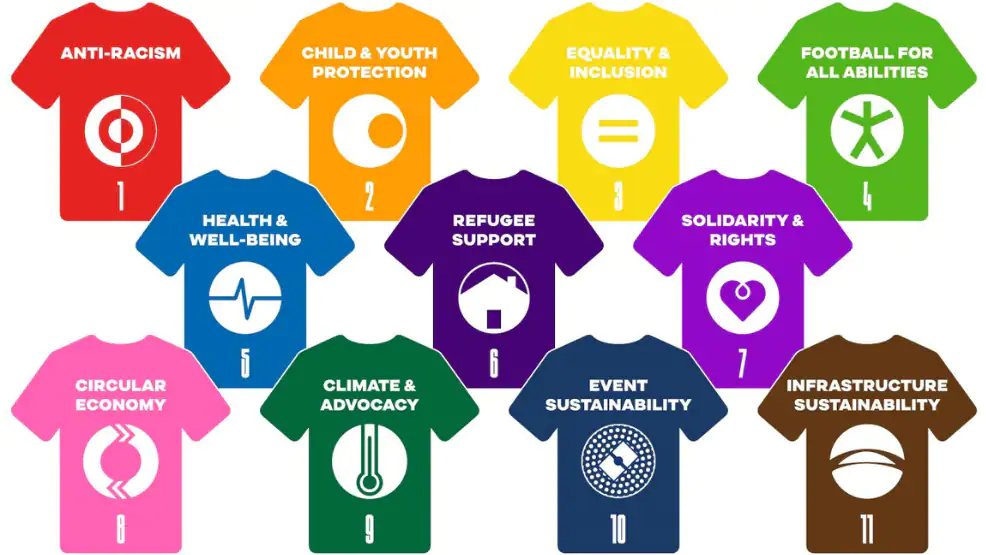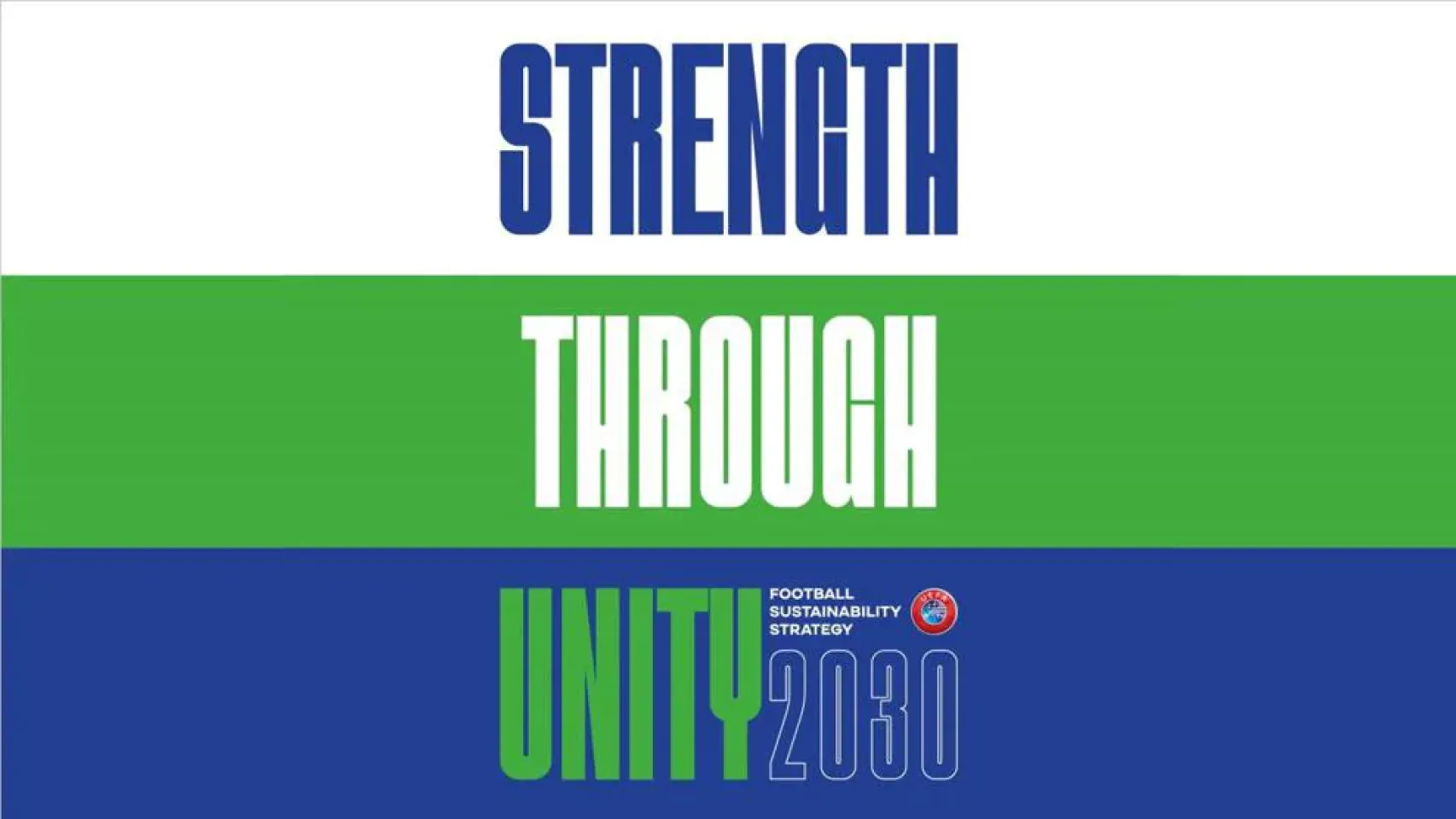‘Strength through Unity’ aims to inspire, activate and accelerate collective action to respect human rights and the environment within the context of European football through to 2030.
UEFA has announced the launch of its innovative Football Sustainability Strategy 2030 – ‘Strength through Unity’, a long-term commitment by UEFA.
Through its new strategy, which will run until 2030, UEFA wants to inspire, activate and accelerate collective action to respect human rights and the environment within the context of European football. However, UEFA cannot act alone. ‘Strength through Unity’ is a practical strategy that aims to mobilise the European football ecosystem around a common approach through clearly defined targets and key performance indicators (KPIs) in order to invest in football’s future prosperity.
Close collaboration essential
Aleksander Čeferin, UEFA President:
"This strategy is titled ‘Strength through Unity’ to signify that these complex issues can only be addressed and solved if we work in close collaboration with all our football stakeholders, agree on a shared agenda, use a common language, and adopt a consistent approach. I am convinced that if football comes together and bundles its power to drive sustainable change, it will be able to have a strong and long-lasting positive impact. As UEFA, we need to set the right example towards sustainable change and inspire and mobilise others to follow."
The strategy was developed by linking football to sustainability, aligned with UEFA’s principles and with the demands of global institutions and civil society. UEFA recognised that sustainability requires a right balance between socially responsible and environmentally friendly actions and practices to preserve the long-term viability of football.
Clear targets
 'Strength through Unity’ is formulated around 11 policies, each supported by a 2030 ambition, targets and KPIs, and will be implemented in five areas of action: UEFA as an internal organisation, UEFA events, UEFA members, the football ecosystem, and partners and society, which includes groups such as sponsors, fans and global institutions.
'Strength through Unity’ is formulated around 11 policies, each supported by a 2030 ambition, targets and KPIs, and will be implemented in five areas of action: UEFA as an internal organisation, UEFA events, UEFA members, the football ecosystem, and partners and society, which includes groups such as sponsors, fans and global institutions.
Each policy is described in detail and every one of them has a clear 2030 ambition and plan linking topics to targets to KPIs, with the understanding that these will evolve to keep up with the fast-moving world of sustainability.
Michele Uva, UEFA’s football and social responsibility director:
“This document is not a final destination but the starting point to operationalise the strategy, a difficult yet fascinating task ahead. We will create guidelines and programmes to support member associations, leagues and clubs in developing their own strategies. We need to work as one team, with one common language and approach, to amplify football’s positive impact and make the most of our collective efforts. We will create a community of manager experts in sustainability to rally their teams. Measuring and reporting will be decisive to demonstrate how football is using its powerful platform to improve sustainability.”
Child and Youth Protection
![]() Child and Youth protection is one of the strategy's policies, aiming to protect the rights of children and youth playing football, preventing and responding to any form of harm. The 2030 ambition is to provide a safe and empowering environment for all children and youth to play football.
Child and Youth protection is one of the strategy's policies, aiming to protect the rights of children and youth playing football, preventing and responding to any form of harm. The 2030 ambition is to provide a safe and empowering environment for all children and youth to play football.
The policy is build around three main topics:
- network and training of child and youth protection officers in European football online
- UEFA child safeguarding platform
- event-specific child and youth safeguarding arrangements and protocols, including access to remedy.
Several existing initiatives are already contributing to the realisation of the 2030 ambition:
- Guidelines for member associations on child and youth protection.
- Series of courses providing training for all stakeholders managing child-related concerns.
- Online platform - uefa-safeguarding.eu - to enhance knowledge, skills and practices to create safer football environments.
Moving forward, UEFA will continue to support dedicated practitioners across the UEFA region in developing and implementing child and youth protection policies. This includes event-specific child and youth safeguarding arrangements and protocols, reporting, case management, training of coaches, event workforce, and volunteers. The organisation continuously updates the online UEFA child safeguarding platform to facilitate continuous learning.
***
‘Strength through Unity’ concurs with internationally recognised frameworks and standards, including, among others, the UN Sustainable Development Goals, the UN Sports for Climate Action Framework, the European Green Deal, the Universal Declaration of Human Rights, the UN Guiding Principles on Business and Human Rights, the UN Global Compact Principles and the Global Reporting Initiative.
UEFA’s approach is likely to evolve through periodic reviews and assessments of progress. This may lead to consolidating some of the policies. An integrated and flexible method is essential to tackle human rights and environmental considerations and balance all aspects of sustainability. A review of the strategy’s effectiveness and architecture is envisaged for 2025.
This journey will present challenges on the way. To overcome these, the European football ecosystem must acknowledge the urgency for action and collaborate around a common agenda.
Strength through unity!

